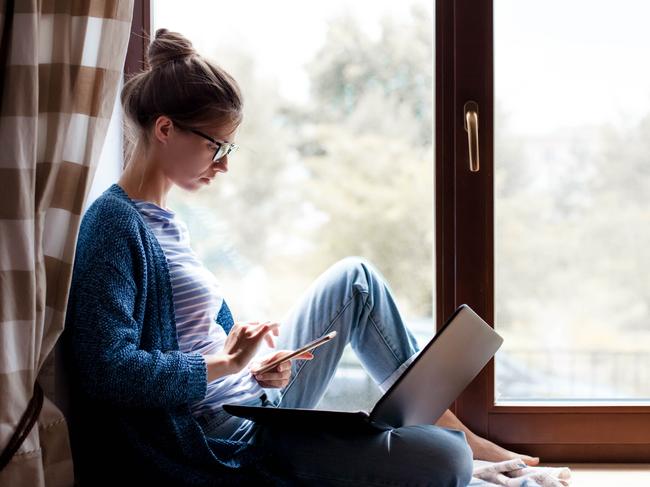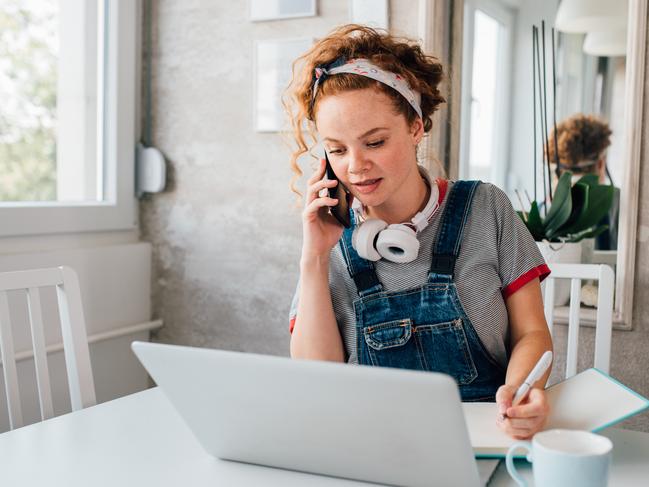COVID-19 causes surge in workers’ mental health appointments
Demand for employee assistance programs is growing as worries of job insecurity, isolation and health weighs on workers. But there are ways to clear your minds. See expert tips.
Coronavirus
Don't miss out on the headlines from Coronavirus. Followed categories will be added to My News.
- Keep workplace culture alive while working remote
- SEEK reveals how job market has changed post-COVID-19
The mental weight of the COVID-19 pandemic has settled on workers, causing a spike in demand for employee assistance programs (EAP).
EAP provider Assure recorded a 15 per cent jump in people reaching out to the employer-funded counselling in March compared with March 2019.
APM chief executive of mental health and wellness Michele Grow, who heads up the Assure programs, said demand initially dipped when social distancing rules disallowed face-to-face sessions but people quickly adapted to phone and digital methods.
“The first week things dropped off, but the demand is going up and quite rapidly,” she said.

EAP provider Benestar had also experienced increased demand since the coronavirus outbreak.
Chief executive Damien Woods reported a “surge in concern” around financial stability, health anxiety and working from home as well as challenges in larger-scale retail settings where workers were dealing with stressed customers.
“We are certainly seeing growth in those numbers and expecting more over time,” he said.
“There are impacts for now and for down the track.”
SMG Health director of organisational development Rose Zaffino said although they had not yet experienced a surge in mental health inquiries from workers, they expected this soon.
“We are all gearing ourselves up as we are starting to see the number of calls for support increasing,” she said.
“The first point of concern has been ‘Am I OK physically?’. Now we are seeing ‘Am I OK mentally as I adjust to a new way of working?’”
A study of 350 workers from Australia and New Zealand by customer experience software company Qualtrics revealed 45 per cent felt their mental health had declined over the last few weeks.
This was mainly caused by anxiety (24 per cent), worrying about their job (20 per cent), stress (18 per cent) and working from home (9 per cent).

Meanwhile, a study of 1000 Australians on behalf of project management platform Wrike found walking was the number one activity people used to clear their minds while working from home (50 per cent) – followed by playing or listening to music (41 per cent) and exercising or meditating at home (33 per cent).
Wrike Asia Pacific regional manager Fintan Lalor said almost half of Australians were experiencing remote work for the first time so might not realise the potential long-term effects on their mental wellbeing.
“When working from home, boundaries disappear, and the space typically used to switch off suddenly becomes your office,” he said.
“We all need our sanctuaries to recharge the batteries, and therefore new boundaries that will help us keep a relaxing space and time.”
Mr Lalor recommended workers set a time to turn off email and work notifications each day; take regular breaks to avoid being “sucked in the spiral of video calls”; and define a work space within the home then avoid taking work into other rooms.

Employee Assistance Professionals Association of Australasia president Lana Schwartz encouraged workers to also take advantage of their employer’s EAP.
“All government organisations have an EAP in place and most large and medium employers do too,” she said.
“The program is confidential and free to the employee, with the employer only seeing aggregated data.
“They offer short-term therapy – three to six sessions a year is average – and employees can use it for anything they like, (such as) career, financial, legal, nutrition, sleep and meal health and general feelings of being stressed.”
TIPS FOR WORKERS
– Schedule a balanced set of activities each day.
– Remain connected with other people through platforms such as Skype, Zoom and WhatsApp.
– Maintain physical good health by minimising stress and conflict, doing some exercise, getting rest and maybe taking supplements helpful for the immune system.
– If you have family members who are not used to being home together, reduce stress and tension by doing joint projects as a family. For example, learn a language or origami.
– Wake up at the normal time, shower and shave, and plan your day.
– Practice gratitude exercises at night. For example, keep a journal by the bed and record three things you are grateful for in your life.
Source: PsychMed program director, medical practitioner and clinical Psychologist Dr Quentin Black
